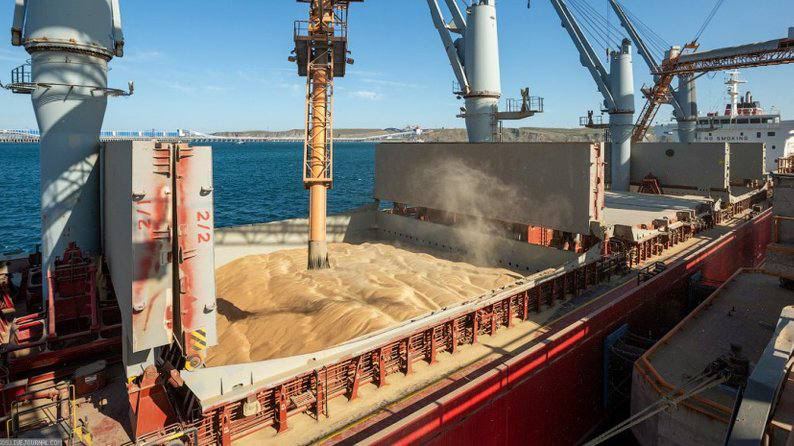Ukrainian exports by its sea corridor reach 22 million tons of cargo despite Russian infrastructure attacks
Secured sea export routes became the result of Ukrainian successful operations against the Russian Black Sea Fleet, which had blocked Ukrainian ports at the beginning of the war. The post Ukrainian exports by its sea corridor reach 22 million tons of cargo despite Russian infrastructure attacks appeared first on Euromaidan Press.

Ukraine’s infrastructure minister, Oleksandr Kubrakov, announced on Sunday that the country has exported 22 million tons of cargo through the Black Sea grain export corridor despite continued Russian attacks on port infrastructure. The corridor was established by Ukrainian armed forces in the summer of 2023 through multiple attacks on the Russian Black Sea fleet.
Over 700 vessels have transited the corridor since last summer, allowing Ukraine to resume vital grain exports from its Black Sea ports. Russia’s invasion had blocked maritime trade routes, worsening the global food crisis.
“The result can be higher in case of modernization and development of ports and infrastructure including auto and railways,” Kubrakov tweeted. “We do all possible for this despite systematic air attacks.“
22 mln tons cargo has been exported through #Ukrainian corridor by more than 700 vessels. The result can be higher in case of modernisation and development ports and infrastructure including auto and rail ways.
We do all possible for this despite systematical air attacks. Last… pic.twitter.com/wBcXvi5BL8
— Oleksandr Kubrakov (@OlKubrakov) February 11, 2024
He said another overnight attack on 11 February attempted to damage grain loading infrastructure, but loading operations continued.
Russia launches massive drone attack across Ukraine. 40 out of 45 drones shot down
Ukraine is one of the world’s largest producers of grains and oilseeds. The successful export corridor has been a lifeline for its battered economy. Analysts estimate up to $10 billion worth of grains are awaiting export as Russia tries to block shipments.
The sea export is especially important due to the blockade of the western Ukrainian border by Polish farmers, who oppose Ukrainian tariff-free food imports amid Ukraine’s continuous integration into the EU market.
Read more:
- Zelenskyy conducted his first meeting with the new General Staff team, announced changes
- Latvia proposes to ban Russian grain imports into EU
- Good harvest and adaptation to war contribute to Ukraine’s expected 4.9% GDP growth in 2023
- Polish farmers take to roads opposing prolonged tariff-free Ukraine food imports
- Ukraine ranks as third largest agricultural supplier to EU
- Polish border blockade traps Ukraine’s critical military supplies, including drone components
You could close this page. Or you could join our community and help us produce more materials like this.
We keep our reporting open and accessible to everyone because we believe in the power of free information. This is why our small, cost-effective team depends on the support of readers like you to bring deliver timely news, quality analysis, and on-the-ground reports about Russia's war against Ukraine and Ukraine's struggle to build a democratic society.
A little bit goes a long way: for as little as the cost of one cup of coffee a month, you can help build bridges between Ukraine and the rest of the world, plus become a co-creator and vote for topics we should cover next. Become a patron or see other ways to support.
The post Ukrainian exports by its sea corridor reach 22 million tons of cargo despite Russian infrastructure attacks appeared first on Euromaidan Press.



